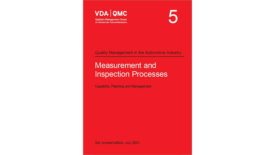Home » Keywords: » process control
Items Tagged with 'process control'
ARTICLES
Software & Analysis
Don’t Touch That Process-Improvement Dial!
Despite your best intentions, you cannot improve a process without first differentiating between common and special causes.
March 21, 2024
Test & Inspection
Navigating the Nuances of Additive Manufacturing Quality Control
The evolution from traditional methods to additive manufacturing represents a paradigm shift.
February 16, 2024
Test & Inspection
When Part Gaging is a Bottleneck
Automatic manual gauging improves process control, yield, and capacity.
January 26, 2024
Measurement
The new VDA Volume 5 – Obligation and Opportunity
Too much measurement uncertainty leads to incorrect conformity decisions, incorrect assessment of machines and production processes, poorer process quality and thus, increased production and testing effort.
December 29, 2023
Lean With Lazarus | Ian R. Lazarus
A Process for All Reasons
This month let's look at how to best walk the tightrope between satisfying customers, stake holders, and budgets.
November 27, 2023
Face of Quality | Jim L. Smith
Marketplace Projection is a Minefield
Predicting marketplace demand is not an exact science.
October 25, 2023
Fellow Traveler | Daniel Zrymiak
Stakeholders: Adroit Navigation for Managing Up and Across
A quality leader within an organization must be an adroit navigator.
October 20, 2023
Face of Quality | Jim L. Smith
Part 2: Delivering the Best
We need to establish clarity about what is expected.
September 27, 2023
Face of Quality | Jim L. Smith
Part 1 of 2: Delivering the Best
I would have never achieved those positive results without someone taking an interest in pushing me.
September 10, 2023
Get our new eMagazine delivered to your inbox every month.
Stay in the know with Quality’s comprehensive coverage of the manufacturing and metrology industries.
SIGN UP TODAY!Copyright ©2024. All Rights Reserved BNP Media.
Design, CMS, Hosting & Web Development :: ePublishing












